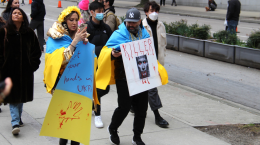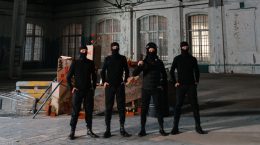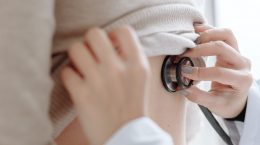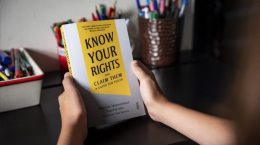Over the years, “Our House” has organized many projects to help Belarus and the Belarusians to put things in order in their home country. Our campaigns covered various areas of activity – from landscaping to solving social and economic problems. The results were saving the lives and families of Belarusians, the disclosure of classified information, and the beauty and comfort of cities. Today we are going to tell you about all the campaigns of the ICCI “Our House” and what has been achieved.
Non-Children play
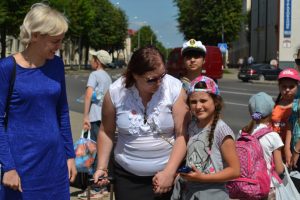 The campaign was a response to Presidential Decree No. 18 “On Additional Measures for State Protection of Children in Dysfunctional Families” adopted in Belarus in 2006. This decree was intended to protect children, but in fact has become a way of pressuring proactive parents and threatening to remove a child from the family, even if the parents care for the child. However, the campaign has also covered other problems related to children: the lack of survivor’s benefits for orphans (they receive only 11-12 roubles pocket money in boarding schools and orphanages); the lack of juvenile justice, the involvement of juveniles in criminal investigations, the failure to provide medical care for children in prison, child slave labour and difficulties with education in prisons.
The campaign was a response to Presidential Decree No. 18 “On Additional Measures for State Protection of Children in Dysfunctional Families” adopted in Belarus in 2006. This decree was intended to protect children, but in fact has become a way of pressuring proactive parents and threatening to remove a child from the family, even if the parents care for the child. However, the campaign has also covered other problems related to children: the lack of survivor’s benefits for orphans (they receive only 11-12 roubles pocket money in boarding schools and orphanages); the lack of juvenile justice, the involvement of juveniles in criminal investigations, the failure to provide medical care for children in prison, child slave labour and difficulties with education in prisons.
As part of the campaign, “Our House” facilitated the return to the families of Katya S., Elvira M., and Gleb G. Through the efforts of our human rights activists, the Sabiryanov family was removed from a socially dangerous situation. Also, activists of “Our House” defended Mark K., a child who suffered from being beaten by adults. In June of this year, we drew up a petition to stop the slave labor of children in Belarus.
Read more about how “Our House” helped Belarusian children here and here.
Deputies to account!
The history of the campaign began in 2011. “Our House” activists set a goal to seek answers to specific questions from local authorities. In various towns of Belarus, they tried to make the deputies report to the electorate, to force them to perform their duties of representing citizens, and to step up the role of councils and deputies in solving the socially important problems of a particular locality.
As part of the campaign in 2012, human rights defenders “Our House” prepared amendments to the new Law “On Appeals of Citizens and Legal Entities” and sent them to the deputies of the House of Representatives. The amendments dealt with the ignoring by deputies of meetings, the lack of contact with deputies by people of no fixed abode, and written appeals.
At the beginning of 2015, “Our House” prepared “10 requirements for the deputies of local councils.” Among the requirements were biannual reports to voters, posting of appointments, dissemination of information about activities in the media, work of a deputy assistant, and an open and accessible email address. As a result, many deputies for the first time began posting reports on their activities on personal websites, and stopped skipping receptions, referring to business trips.
The activists managed to solve the issues of improvement of several micro-districts in Gomel, the problem of the park near the hotel “Tourist” in the regional center. In Slutsk, they obtained reports from the deputies to the voters. In Bobruisk, the campaign succeeded in solving the issues of the convenience of sidewalks and roads for people with disabilities. In the village of Oktyabrsky, the deputies began to hold receptions for citizens during non-working hours on the territory of the district. In Slavgorod, because of the activists’ campaign activities, repairs began in a local dormitory.
Beware, police!
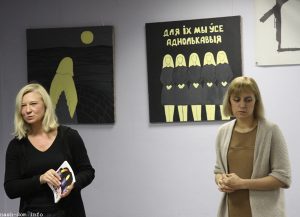 This campaign was launched by “Our House” in 2011 after women activists experienced violence at the hands of law enforcement agencies between 2006 and 2011. An upsurge in violence was observed during the presidential elections (early 2006, late 2010). The most common types of violence are unjustified detentions, arrests and beatings, fines, politically motivated dismissals from work, school, and university.
This campaign was launched by “Our House” in 2011 after women activists experienced violence at the hands of law enforcement agencies between 2006 and 2011. An upsurge in violence was observed during the presidential elections (early 2006, late 2010). The most common types of violence are unjustified detentions, arrests and beatings, fines, politically motivated dismissals from work, school, and university.
The campaign released information about a sadistic police officer from the Frunzenskiy district department of internal affairs, Dinas Linkus, who, after beating Olga Karach in 2011, was sent to Grodno, and even received the rank of colonel. When he was tried in 2012 for the beating of Alexei Sergei, head of the Shchuchin district department of the Department of Protection, “Our House ” called on the public to come to his open trial.
The campaign activists visited Vilnius, where they talked about the specific “female” problems that women faced in prison, about the attitude of male police officers towards women demonstrators. The campaign included the creation of books, a children’s coloring book, a postcard and video clips dedicated to participants in the peaceful protest in Minsk on 19 December 2010.
Poverty belt
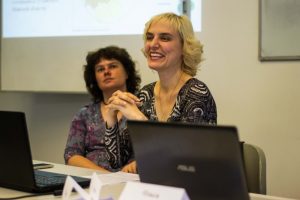 In 2014, “Our House” took up the issue of poverty in Belarusian cities around the regional centers and the capital. It is no secret that the standard of living in such settlements is traditionally inferior to that of big city dwellers. Such areas are often referred to as the “poverty belt”. For example, in the Minsk region there are 19 cities in the poverty belt.
In 2014, “Our House” took up the issue of poverty in Belarusian cities around the regional centers and the capital. It is no secret that the standard of living in such settlements is traditionally inferior to that of big city dwellers. Such areas are often referred to as the “poverty belt”. For example, in the Minsk region there are 19 cities in the poverty belt.
The “Our House” team held a panel discussion on “Approaches to Measuring the Poverty Phenomenon in Belarus and Modernization with a Social Perspective”. In 2016, the “Our House” program on overcoming poverty in Belarus appeared, noting that the poorest Belarusians are those who work for the authorities in a conscientious manner.
In 2020, the “Our House” team produced a report on economic, social, and cultural rights, the rule of law and problems in the judicial and penitentiary systems in Belarus. It also touched about poverty, where children are taken away from parents living below the poverty line. The report was sent to the UN Special Rapporteur on Human Rights in Belarus.
BY.Bench
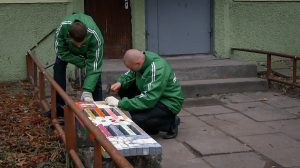 In 2014, “Our House” launched another beautification campaign. This program was not just about benches – it was about improving the living environment of Belarusian citizens. As part of the campaign, the activists planned the installation and repair of benches, the installation of equipment for free Internet access points using Wi-Fi technology, and solutions to other communal problems.
In 2014, “Our House” launched another beautification campaign. This program was not just about benches – it was about improving the living environment of Belarusian citizens. As part of the campaign, the activists planned the installation and repair of benches, the installation of equipment for free Internet access points using Wi-Fi technology, and solutions to other communal problems.
As a result of the campaign, benches appeared in the center of Gomel, Slutsk and other Belarusian cities. To do this, activists sprayed graffiti “You will stand” on the asphalt on the pavement tiles. In the end, the inscription was noticed, and it was able to have an additional impact on the decision-making process. There was also other infrastructure needed by cities: gazebos, lanterns.
A logical continuation of the campaign was the BY.Gorodok program. As part of the campaign, activists addressed the placement, maintenance, safety, and preservation of playgrounds in or outside yards. As a result of the campaign, 15 local problems were resolved in Gomel alone: new benches appeared, cemeteries were put in order, trees were planted, and sidewalks were marked.
People’s Deputy
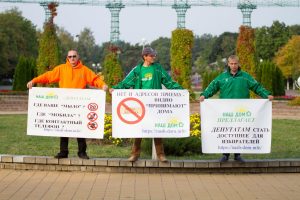 The campaign began in 2017. The activists set it as a goal to get citizens involved in public affairs and local problems, to activate local councils and deputies, to encourage local councils of deputies to take real action and to monitor deputies.
The campaign began in 2017. The activists set it as a goal to get citizens involved in public affairs and local problems, to activate local councils and deputies, to encourage local councils of deputies to take real action and to monitor deputies.
As part of the campaign, our activists managed to get the contact phones of four deputies to be posted on the website of the Slutsk regional executive committee. In Bobruisk, activists managed to achieve the inclusion of one of the houses in the capital repair plan. In Soligorsk, it was also possible to get the phones and email addresses of the deputies to be posted on the website of the regional executive committee.
Deputies who do not participate in the life of their constituency were also exposed. For example, they do not hold meetings with voters, do not post reports on websites. But those who solved the problems of the district residents received letters of gratitude from “Our House” and the honorary title of People’s Deputy.
You and I are in the same house
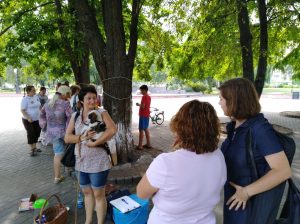 The campaign, which began in 2018, is dedicated to the problems of stray animals in Belarus. The objectives that activists have set for themselves by launching the campaign are to pass a law on animal protection, considering the views of animal advocates and the standards of a humane society, to accede to the European animal protection conventions, and to change the status of animals as someone’s property.
The campaign, which began in 2018, is dedicated to the problems of stray animals in Belarus. The objectives that activists have set for themselves by launching the campaign are to pass a law on animal protection, considering the views of animal advocates and the standards of a humane society, to accede to the European animal protection conventions, and to change the status of animals as someone’s property.
The activists began by creating a petition dedicated to the protection of animals. Over several years of campaigning, “Our House” has written about the many cases of abuse of our little brothers, the struggle of animal advocates for animals and the way the state treats volunteers. In Pinsk, “Our House” took part in a campaign to adopt homeless animals. In Orsha, activists covered the trial of Yulia Malysheva, who was broadcasting from a car depot where animals are kept in inappropriate conditions.
“Our House” activists participated in the 2019 Brigitte Bardot Foundation’s meeting with animal rights activists in Belarus. Our activists also managed to obtain a plan of amendments to the draft decree of the Council of Ministers “On Approval of the Rules of keeping domestic dogs and cats, as well as capture of neglected animals in populated areas of the Republic of Belarus”.
Children-328
On 23 September 2018, “Our House” launched a campaign dedicated to juveniles who have been jailed for minor non-violent drug offences. Such children often receive huge sentences of 8, 10 or more years. During detention and investigation, they are beaten, tortured, pressured and, once in prison, forced to work for the Lukashenko regime for a pittance.
As part of the campaign “Our House” put forward the requirements:
– to amnesty all juvenile prisoners under Article 328;
– review all criminal cases involving minors;
– to quash claims for compensation for the money spent on expert examinations in such cases;
– to abolish the tightening of the regime in the penal colonies for children-328;
– prohibit the placement of children in solitary confinement;
– end the ban on visits and parcels for minors;
– to create public commissions to control the conditions of detention of children in places of deprivation of liberty;
– to ensure that children-328 receive education and other requirements.
Thanks to the efforts of “Our House”, 2019 has seen a change in anti-drug legislation, with the lower threshold of the sentence being reduced by two years and some categories of convicts-328 falling under amnesty for the first time. Our data on children-328 has been included in Amnesty International’s reports, as well as in the reports of the UN Special Rapporteur on Belarus. Several teenagers, who were supported by “Our House”, were released ahead of schedule.
You can read more about the history of the Children-328 campaign in our review at the link.
Tg House
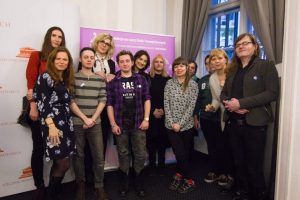 The campaign began in 2019 after monitoring discrimination against transgender people in Belarus. The main goal of the campaign was to reduce stigma and discrimination against transgender people in Belarusian society. By launching the campaign, Our House activists wanted to show that transgender people also require medical, legal, to have families, to be educated and, most importantly, to be protected by the state.
The campaign began in 2019 after monitoring discrimination against transgender people in Belarus. The main goal of the campaign was to reduce stigma and discrimination against transgender people in Belarusian society. By launching the campaign, Our House activists wanted to show that transgender people also require medical, legal, to have families, to be educated and, most importantly, to be protected by the state.
In January 2020, activists took part in the conference “Transgender in the Family. Experience, knowledge, recommendations”, organized by the Polish Foundation “Trans-Fusia”, with the participation of the Ombudsman of the Republic of Poland. The meeting was attended by Deputy Ombudsman of Poland Anna Makhinska, ex-deputy of the Seimas Anna Grodzka, psychologist Agnieszka Rynovetska, human rights activist Karolina Wienckiewicz. The representatives of Belarus shared the main problem of transgender people in Belarus.
In April-June 2020, Tg House began to provide material assistance to transgender Belarusians, allowing them to survive the quarantine. Targeted assistance consisted of a food kit and personal protective equipment. On 6 July 2020, it was announced that “Our Housee’s campaign had become a member of Transgender Europe (TGEU).
Corona-2020
The campaign started in April 2020, after the first months of the spread of the coronavirus in Belarus. Starting it, the activists of “Our House” planned to force the Belarusian authorities to fulfill their obligations to the people and provide social guarantees to people in the context of the COVID-19 pandemic. The authorities were required to do:
– give open information about the situation with coronavirus in regions and cities;
– to provide everything the hospital needs;
– to raise salaries for doctors;
– release minors from prisons under house arrest;
– pay benefits to families with children under 18;
– transfer pupils and students to distance learning;
– pay benefits to pensioners;
– to cancel the payment of public rental housing to citizens and the rent of business premises for three months;
– to exempt private business from taxes for three months;
– to pay an allowance to individual entrepreneurs;
– postpone the payment of fines and government payments for three months;
– to organize free insurance of medical workers and free transport delivery of all returning Belarusians from the borders to the nearest railway stations.
As part of the campaign, we talked about how food parcels to prisons for children-328 have changed, about what happens in Belarusian schools during the pandemic. We also released masks with the “Our House” logo. We helped the transgender community of Belarus with food parcels and protective equipment. And in Bobruisk, we organized a free distribution of masks for the townspeople.
NPP: pros and cons
 In time for the commissioning of BelNPP in 2020, “Our House” has planned the launch of a campaign against its launch. The main complaints against the authorities in connection with the BelNPP are the lack of decisions on the management of spent nuclear fuel, safety problems identified by European experts, and construction accidents. Our House activists were also concerned about the lack of data on the economic viability of a nuclear power plant, the lack of large industrial energy consumers, and the negative impact of a nuclear power plant on the development of sustainable energy.
In time for the commissioning of BelNPP in 2020, “Our House” has planned the launch of a campaign against its launch. The main complaints against the authorities in connection with the BelNPP are the lack of decisions on the management of spent nuclear fuel, safety problems identified by European experts, and construction accidents. Our House activists were also concerned about the lack of data on the economic viability of a nuclear power plant, the lack of large industrial energy consumers, and the negative impact of a nuclear power plant on the development of sustainable energy.
Considering the problem of the nuclear power plant, “Our House” touched upon its negative impact on nature, cultural heritage, and the health of local residents. In addition, the NPP increases the dependence of Belarus on Russia, violates the rights of citizens of Belarus. “Our House” appealed to the authorities to postpone the launch of the BelNPP until all problems are resolved, to consult on the advisability of continuing the moratorium on the construction of a nuclear power plant in Belarus as not in the interests of the country, and to develop and discuss with the public a strategy for sustainable nuclear-free development in Belarus.
S.O.S. children’s hospice
The campaign launched by “Our House” in the autumn of 2020 was a response to the state’s crackdown on the director of the children’s hospice in Grodno, Olga Velichko. “Our House” demanded that the authorities stop the criminal prosecution of Olga Velichko.
As part of the campaign, a petition “Stop the political pressure on the Grodno Children’s Hospice!” was created, which was signed by over 50,000 people in a week. Olga Karach sent letters to MEPs Andrius Kubilius and Petras Aushryavichus, to Amnesty International, UN Special Rapporteur on Human Rights in Belarus Anais Marin, to the Office of the UN High Commissioner for Human Rights, to UNICEF with a request for help in meeting the goals set for the campaign.
ICCI “Our House” continues to help Belarusians, despite the rather difficult situation in the country. In extreme conditions, we report on what is happening in Belarus, reach out to foreign politicians and share our successes so that as many people in the world as possible know about what Belarusians are going through in their struggle for freedom. We believe that we have many victories ahead – and the most important one will be the victory over Lukashenko.


